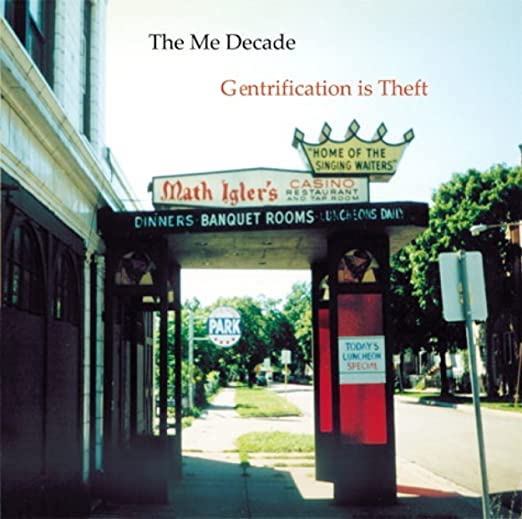- Music
- >
- Gentrification Is Theft
Gentrification Is Theft
This 12 song stew of Larry O. Dean's self-conscious, sardonic songwriting is rife with aromatic arrangements, tasteful melodies, honeyed harmonies and delicious witticisms. For all it's titular politicking, Gentrification Is Theft offers up an ample side dish of self-effacing humor along with its more serious undertones, which in turn makes it a rich, rewarding album that reveals more and more of itself upon repeated listens.
Gentrification Is Theft
This 12 song stew of Larry O. Dean's self-conscious, sardonic songwriting is rife with aromatic arrangements, tasteful melodies, honeyed harmonies and delicious witticisms. For all it's titular politicking, Gentrification Is Theft offers up an ample side dish of self-effacing humor along with its more serious undertones, which in turn makes it a rich, rewarding album that reveals more and more of itself upon repeated listens.
Fun with a Purpose
Debut album from The Injured Parties!
Recorded at North Branch Studios, Chicago, IL; engineered by Jeff Hamand; assistant engineering by Carly Anderson and Ryan Neuschafer. Mixed by Mark Nevers at Beech House Recording, Nashville, TN. Mastered by Mike Hagler at Kingsize Sound Labs, Chicago, IL.
Fables in Slang
Fables in Slang, the Chris Stamey-produced sophomore effort, finds the band more streamlined and polished sonically, with a greater sense of dynamic interplay to boot. When the band is self-referential, the hooks are too charming to resist, and when they are their most ambitious, they are impressive beyond anything they have done previously. An excellent swan song of a band that packed up before we were ready for them to leave.
Brief Nudity
Brief Nudity’s poems are concerned with the juxtaposition between elegy and irreverence. The first section, opening with an epigraph by singer-songwriter John Prine, is anchored by a quartet of persona poems recounted from the perspective of victims of the 1989 Bay Area Loma Prieta earthquake, an event that Larry O. Dean encountered firsthand. Other poems in this section are more personal, delving into familial reminiscence, the fragility of friendships, and urban living. A quote by gonzo rock ’n’ roll journalist Lester Bangs starts the second section. Fellow pundit Greil Marcus defined Bangs’ endeavors as “one man’s attempt to confront his loathing of the world, his love for it, and to make sense of what he found in the world and within himself.” Bangs’ comment on the misguided notion that art needs be “serious,” and Marcus’ characterization of his colleague's sui generis oeuvre guide this section's selections—poems lampooning and extolling popular culture’s stranglehold on our collective unconscious, verbally playful and boisterous verse.
About the Author
In this collection, Larry O. Dean displaces the focus of auto-referentiality from the text to the author as the paratextual “author bio” becomes the matter of the poems. About the Author is a wry comment on the increasing prevalence of peripheral writings (blurbs, review excerpts, writer and translator bios, publisher mission statements, “shout out”-style acknowledgments, etc.) and their parasitical relationship to literary texts.
Activities of Daily Living
“Activities of daily living” are routine occupations that people do every day without needing assistance. Larry O. Dean’s book examines those quotidian enterprises—reading and writing email, watching TV, going out to eat, working a job, parking the car, grocery shopping, online purchasing—while considering the juxtaposition between revelation and irreverence, employing an objective, but no less passionate appraisal of popular culture and its byproducts. It includes both traditional and experimental poems in fixed and open forms, such as Oulipian, persona, metrical, sestina, found, a satiric sequence based on the zodiac, and more.

